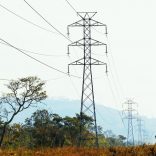Mozambique: President Chapo visits ExxonMobil, highlights industrialisation and knowledge ...
Mozambique’s Sovereign Wealth Fund receives US$200 million in H1

FILE - For illustration purposes only. [File photo: Eni]
The Mozambican state collected US$210 million from natural gas exploitation which were invested in the Mozambique Sovereign Wealth Fund (FSM) by June this year, more than in all of 2024.
Figures from the Ministry of Finance economic and social report on the implementation of the State Budget from January to June analysed by Lusa indicate that these revenues include US$164.69 million from 2024 and US$45.24 million from the first half of this year.
“They were deposited in the Transitional Account held at the Bank of Mozambique, under the terms of Article 6 of Law No. 1/2024 of January 9, which creates the Mozambique Sovereign Wealth Fund,” the document reads.
For the entirety of 2024 – the first year of the new fund – the revenues delivered to the Sovereign Fund amounted to US$158.8 million (€135.5 million), according to previous government data.
The chairman of the Sovereign Fund Oversight Committee, Emanuel Chaves, assumed in May the objective of ensuring that natural gas revenues are channelled and applied in a “transparent” manner.
“We will ensure […] that the 40% [of the proceeds from natural gas exports] that should be deposited in the FSM account are reaching it, [that] they are being properly managed […] and are being applied responsibly and transparently,” Emanuel Chaves told reporters after being elected to the position by parliament.
Parliament, which is responsible for appointing the Oversight Committee, approved the creation of the Mozambique Sovereign Wealth Fund on December 15, 2023, with revenues from natural gas exploration, which are expected to reach US$6 billion annually by the 2040s.
Emanuel Chaves, who has over 30 years of experience in the civil aviation sector and is also a university professor, reaffirmed that the Oversight Committee would study and visit “success stories” of sovereign wealth funds in other countries and define the best guidelines.
The Civic Movement on the Sovereign Fund, a platform for civil society organizations, on May 13 deemed illegal the government’s intention to use the fund to finance social projects, as provided for in the 2025 State Budget, approved that month in parliament.
“This is illegal, it’s a violation, it violates the law, because the [WSF] law clearly states that no one can withdraw funds from the sovereign wealth fund at will. The government has to justify why the portion that goes to the Sovereign Fund, corresponding to 40%, will no longer go. It has to justify this in the document [Economic and Social Plan and State Budget – PESOE 2025],” Fátima Mimbire, coordinator of the Civic Movement on the Sovereign Fund, told Lusa.
According to Mimbire, the government has not yet justified, nor is it included in the PESOE, the reason for using the Sovereign Fund percentage to finance social and economic projects: “This is not clear in the PESOE. So, in what document does the government explain that it needs to withdraw this 40% to invest in these areas? Who did it consult, who did it ask for authorization to reach this decision?”
The 2025 PESOE defines 15 projects to be financed this year by the WSF, such as maintaining “95% or more coverage of fully vaccinated children under one year old,” with 416.4 million meticais (€5.7 million); the allocation of means of production to 468,169 households, with 201.3 million meticais (€2.8 million); and the expansion and rehabilitation of water supply infrastructure, with 679 million meticais (€9.4 million).
Also included are the acquisition and distribution of 15,080,550 textbooks for primary schools, costing 779.5 million meticais (€10.8 million); the construction of 12 secondary schools, “according to quality and resilience standards”, for 311.6 million meticais (€4.3 million); and 214 primary school classrooms for 225.8 million meticais (€3.1 million).











Leave a Reply
Be the First to Comment!
You must be logged in to post a comment.
You must be logged in to post a comment.